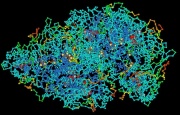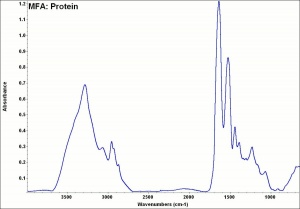Protein
Description
Proteins are natural polymers composed of chains of amino acids connected by peptide linkages. Proteins occur in the cells of all living organisms and in biological fluids. Their primary structure is determined by the order of their amino acids. Examples of soluble proteins include enzymes and antibodies. Insoluble proteins include Keratin and Collagen. Examples of protein containing compounds are Leather, Gelatin, Albumen, Animal glue, Silk, Ivory, Egg, and Casein.
Synonyms and Related Terms
natural polyamide; ivory; zein; blood; animal glue; leather; silk; protein (Dan., Sven.); Proteine (Deut.); proteina (Esp.); protéine (Fr.); proteine (It.); proteïne (Ned.); białko (Pol.);
Other Properties
Autofluorescence is pale white to pale yellow
Non-fluorescent detection agents: Amido black, Brilliant Blue R, Ponceau S, Resorcinol blue
Fluorescent detection agents: Blancophor R, Dansyl chloride, Fluorescamine, Fluorescein isothiocyanate (FITC), Lissamine Rhodamine B Sulfonyl Chloride (LISSA), Tetramethyl rhodamine isothiocyanate (TRITC); Texas Red®; Cycloheptaamylose dansyl chloride (DC-C7A)
Sources Checked for Data in Record
- R. J. Gettens, G.L. Stout, Painting Materials, A Short Encyclopaedia, Dover Publications, New York, 1966
- G.S.Brady, Materials Handbook, McGraw-Hill Book Co., New York, 1971 Comment: p. 637
- Random House, Webster's Encyclopedic Unabridged Dictionary of the English Language, Grammercy Book, New York, 1997
- John S. Mills, Raymond White, The Organic Chemistry of Museum Objects, Butterworth Heineman, London, 2nd ed., 1994
- The American Heritage Dictionary or Encarta, via Microsoft Bookshelf 98, Microsoft Corp., 1998
- Art and Architecture Thesaurus Online, http://www.getty.edu/research/tools/vocabulary/aat/, J. Paul Getty Trust, Los Angeles, 2000

